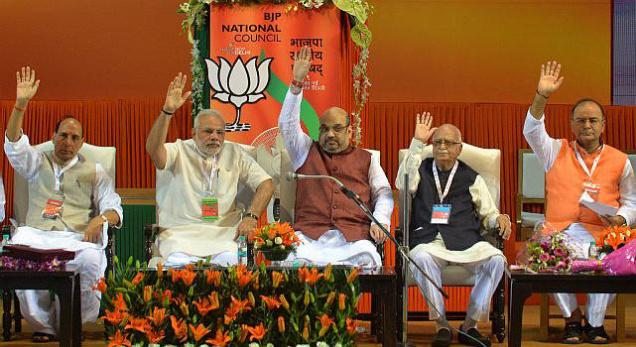On the evening of 31st December 2016, I sat with a bunch of friends waiting for the party to begin. Amidst the usual college banter, one of them suddenly exclaimed, “What did he say man? I wanted to watch, but I missed it. Can someone please bring me up to date?” An animated discussion ensued. I was shocked. I have known them for years, and they are the kind who remain as far from all things political as possible. Then I thought about the year that was fast coming to an end, and found it quite fitting.
2016 was the most important year for the BJP. The party established itself in the Indian psyche in a manner that only the Congress Party had so far.
The golden rule in independent India was that many come and go, but the Congress goes on forever. For the first time, it seems as if this law has ceased to operate. The BJP has emerged not as another Janta Dal or Communist Party, but an alternative which has stood the test of time. And more importantly, it is here to stay.
The party did not taste massive electoral successes during the year. Yes, it won the state of Assam, and managed to form a government in neighbouring Arunachal Pradesh on the last day of the year. Yes, its vote-share saw substantial jumps, and several municipalities across the country turned saffron. But what really mattered were the spate of measures which affected each Indian deeply. They created enough disruption, changed the country in radical ways, and ensured that this brand of politics is now cast in stone. ‘Disruption’ and ‘radical’ are good words sometimes.
Prime minister Modi’s speech on the last day of 2016 wasn’t radical. Most people, like my friends, were expecting him to drop another bombshell. This is what they are used to now. One year ago, BJP was licking its wounds after losing the Bihar elections. The Modi wave had waned, and the general interest spawning from the initial enthusiasm was fast eroding. Three things happened in between and changed the party’s fate: the arrest of anti-India students, the surgical strike against Pakistan and demonetization. When Narendra Modi took office, India thanked its stars for choosing a prime minister who spoke. Two years down the line, the country realizes he means business- when he speaks, everyone listens.
One can debate the arrest of anti-India students endlessly, but not the BJP government’s commitment to a strong and united India. One can debate prime minister Modi’s Pakistan policy, but not how India avenged its martyrs. One can debate demonetisation since everybody has a story to tell, but not Mr. Modi’s guts to follow his conscience. Apart from some with vested interests, Mr. Modi stands out from the rest of the political class. While the latter continues with its daily bickering and politicking, Narendra Modi has emerged as a figure that transcend this chaos. Many leaders have been revered in India, but the place prime minister Modi now occupies in the Indian psyche is unique.
Courtesy the hollowness of political rhetoric, we see a new trend world-over wherein the electorate ceases to take anything politicians stand for or talk about at face value and places its trust in personalities they are most comfortable with at the helm of affairs. This explains the Trump phenomenon in part. Narendra Modi, like every politician, has spoken about teaching Pakistan lessons and ending corruption. The difference between him and the others is that when he got the opportunity, he showed spine. Time will tell how his moves fared, but he showed spine and nobody can take that away from him. Most Indians speak about corruption and Pakistan, the two menaces that plague India, and have ready opinions of how to tackle them. In Narendra Modi, Indians have found a hero.
The disruptions in 2016 were hard hitting. The BJP shaped India in several ways this year. The intent was much appreciated, and people like my friends are eagerly waiting for more. This is a party that’s here to stay, and all because of the year 2016.
